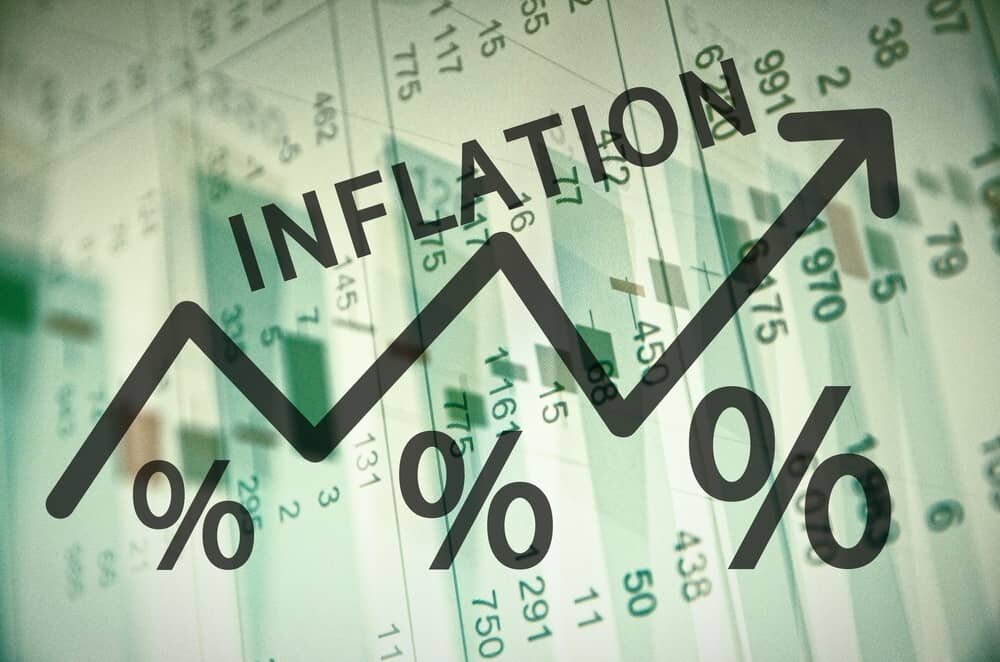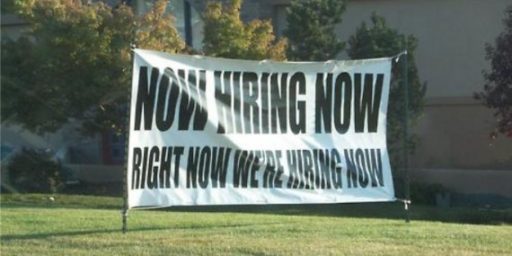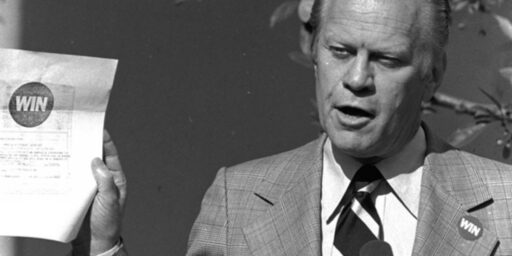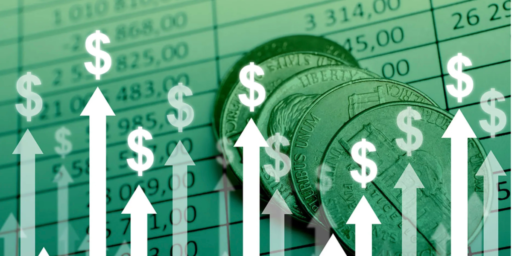Why is Inflation So High?
The economy, it turns out, is complicated.

Nobel Prize-winning economist and NYT columnist Paul Krugman admits, “I Was Wrong About Inflation.”
In early 2021 there was an intense debate among economists about the likely consequences of the American Rescue Plan, the $1.9 trillion package enacted by a new Democratic president and a (barely) Democratic Congress. Some warned that the package would be dangerously inflationary; others were fairly relaxed. I was Team Relaxed. As it turned out, of course, that was a very bad call.
I was Team Inflation but mostly Team Unnecessary. Regardless, my interest isn’t so much in who got it right but in what lesson we might learn from this going forward.
While I would very much like it to be “You should listen to Joyner, not Krugman,” that’s probably not the way to bet on economic forecasting.
But what, exactly, did I get wrong? Both the initial debate and the way things have played out were more complicated than I suspect most people realize.
You see, this wasn’t a debate between opposing economic ideologies. Just about all the prominent players, from Larry Summers to Dean Baker, were Keynesian economists, with more or less center-left political leanings. And we all had similar views, at least in a qualitative sense, about how economic policy works.
This is how debates are supposed to work. Experts disagree on complicated matters all the time and can do so in good faith. It really, really helps, though, if they agree on the basic framework and, well, the facts. (And, to be clear, my understanding is rudimentary compared to professional economists, much less the world-leading experts under discussion here.)
What we had instead was an argument about magnitudes. The rescue plan was huge in dollar terms, and as Team Inflation warned, if it had a normal-size “multiplier” (the increase in gross domestic product caused by a dollar of additional government spending) it would lead to a highly overheated economy — that is, to a temporary surge in employment and gross domestic product far above their sustainable levels, and hence high inflation.
Those of us on Team Relaxed argued, however, that the structure of the plan would lead to a much smaller surge in G.D.P. than the headline number would suggest. A big piece of the plan was one-time checks to taxpayers, which we argued would be largely saved rather than spent; another big piece was aid to state and local governments, which we thought would be spent only gradually, over several years.
We also argued that if there were a temporary overshoot on G.D.P. and employment it wouldn’t sharply increase inflation, because historical experience suggested that the relationship between employment and inflation was fairly flat — that is, that it would take a lot of overheating to produce a big inflation surge.
Again, both predictions were at least plausible. As a non-economist, I would also argue that it would have been perfectly reasonable to simply be on team Screw Inflation. Indeed, I was on that team at the height of the pandemic, with its partial lockdowns and massive closure of businesses. It was just that, by early 2021, the “Rescue” was just no longer necessary. (It was, however, understandable: the Biden Administration is essentially the next-level-down folks from the Obama Administration and they came to rue under-shooting in the response to the Great Recession they inherited. They were damned sure not going to make that mistake again.)
So here’s the odd thing: The multiplier on the rescue plan does, in fact, seem to have been relatively low. A lot of consumers saved those checks; state and local government spending rose by less than one percent of G.D.P. Employment is still below its prepandemic level, and real G.D.P., while it has recovered to roughly its prepandemic trend, hasn’t shot above it.
Yet inflation soared anyway. Why?
Much, although not all, of the inflation surge seems to reflect disruptions associated with the pandemic. Fear of infection and changes in the way we live caused big shifts in the mix of spending: People spent less money on services and more on goods, leading to shortages of shipping containers, overstressed port capacity, and so on. These disruptions help explain why inflation rose in many countries, not just in the United States.
That all makes sense.
But while inflation was confined mainly to a relatively narrow part of the economy at first, consistent with the disruption story, it has gotten broader. And many indicators, like the number of unfilled job openings, seem to show an economy running hotter than numbers like G.D.P. or the unemployment rate suggest. Some combination of factors — early retirements, reduced immigration, lack of child care — seems to have reduced the economy’s productive capacity compared with the previous trend.
Further, in Krugman’s defense, these would have been really hard to predict. Even though people (not just Americans) are over the pandemic, we’re still very much still figuring out what the new normal is going to be.
Even so, historical experience wouldn’t have led us to expect this much inflation from overheating. So something was wrong with my model of inflation — again, a model shared by many others, including those who were right to worry in early 2021. I know it sounds lame to say that Team Inflation was right for the wrong reasons, but it’s also arguably true.
And hardly unprecedented. Again, projecting something as complicated as mass human behavior over time is more art than science. Experts are wrong a lot and, even when they’re right, we/they get parts of the analysis wrong. (In the main, I think political scientists are more cognizant of this than economists, who think they can get it perfectly right if they have enough data.)
One possibility is that historical experience was misleading because until recently the economy was almost always running a bit cold — producing less than it could — and inflation didn’t depend much on exactly how cold it was. Maybe in a hot economy the relationship between G.D.P. and inflation gets a lot steeper.
Also, disruptions associated with adjusting to the pandemic and its aftermath may still be playing a large role. And of course both Russia’s invasion of Ukraine and China’s lockdown of major cities have added a whole new level of disruption.
Absolutely. And, while I’m hardly shocked by Russia’s invasion of Ukraine, it’s not something that I predicted or was factoring into the seat-of-the-pants calculations that put me on Team Inflation.
Looking ahead, the economy is currently cooling off — the decline in first quarter G.D.P. was probably a quirk, but overall growth seems to be running below trend. And private sector economists I talk to mostly believe that inflation either has already peaked or will peak soon. So things may seem less puzzling a few months from now.
I honestly don’t have enough understanding of the factors to make a meaningful prediction. That continuing to pump trillions of dollars of debt-driven spending into the economy could overheat it is Econ 101 stuff. Regardless, one hopes the folks Krugman is talking to are right.
It’s true that inflation is good for some people. If you’re heavily in debt, for example, you now owe a lot less. But it’s also ruinous for the retired and near-retired, whose savings have shrunk considerably.
In any case, the whole experience has been a lesson in humility. Nobody will believe this, but in the aftermath of the 2008 crisis standard economic models performed pretty well, and I felt comfortable applying those models in 2021. But in retrospect I should have realized that, in the face of the new world created by Covid-19, that kind of extrapolation wasn’t a safe bet.
Again, as someone who studies international relations and the politics of war for a living, I’m painfully aware of how bad we are at predicting the future. As complicated as the physical sciences are, the variables in social science are more numerous, harder to measure, and, most importantly, sentient.
Regardless, Krugman’s column illustrates how this is all supposed to work. He and a lot of other brilliant economists got something wrong and they’re now busy trying to figure out what they missed so that they can adjust their models. Meanwhile, Summers and others who got it right are doing exactly the same thing, quite often in collaboration with those who got it wrong.






As a mea culpa it makes sense for Krugman to focus on his estimate of the response to U. S. fiscal policy. And this may explain why U. S. inflation is a bit higher than other developed countries. But U. S. Fiscal policy does not explain inflation in Europe. Econ forecasting is based on models that are heavily based on history. History that may not match odd times.
I was a financial analyst before retirement. I am a contrarian by nature, and it served me well in my job. I was often in meetings with the a roomful of people who were each convinced they were the smartest people in the room. Part of my job was to pick apart new ideas and point out the potential financial pitfalls with these ideas. My last job was with Nielsen, and my specialty was survey costs (TV and radio ratings). I used to say as far as costs went the ceiling was one hell of a lot higher than the floor was lower. A new process that we estimated would cost a $1 million might end up costing $750k but could also cost $3 million.
I think this is part of what happened with inflation and how the Fed screwed up. I honestly think they thought it was mostly transitory and it would take care of itself. It might peak at maybe 4 – 5%, cost a little pain and then go back to 2%. I also think there was a huge element of protecting the markets. The Fed Board are all very wealthy people, and all their friends are wealthy people. Inflation doesn’t affect them personally, and in the short run it doesn’t necessarily hurt companies. IMO when Powell testified that they screwed up on inflation that badly he should not have been re-nominated as Fed governor. The Fed has a few major objectives, and they completely missed on one of those objectives.
And after all this time I still think they are protecting markets. It doesn’t help when administration flunkies talk about household balance sheets being flush with cash.
Nothing wrong with getting the feed-through estimation wrong, the bet on the need made sense.
What has been wrong is inflation denialism and poopooing for the past six to nine months in Left circles when the data became clear (see Drum e.g. unfortunatley). That was ideology/politically molitivated reasoning trumping clear data trends that a combination of factors had broken equilibrium.
@senyordave:
Bollocks. The central bank staffing and orientation has been substantially under pressure not from “the wealthy” to ignore inflation but from populist / Lefty side (as one can see in the opinion the Wall Street Journal and Fox people have been baying bloody murder over inflation). Rather it is the economic performance fears and mixed to confusing overall labour markets data which have been strange since pandemic.
Because the money supply is too large and we need to increase taxation to shrink it.
Repeal the Trump tax cuts
Wow. A prominent economist who was right on the mechanics, but wrong on the outcome, admits that he was wrong nonetheless. Add in a blogger who was right on the outcome, but wrong on the mechanics, acknowledging that. Isn’t that refreshing
Let’s also not discount the tendency for price gouging. Although I think this may be somewhat overstated by partisans, it is almost certainly going on (be cause it happens even when there are good times especially in industries were competition is slime to none).
I had no thoughts on inflation and its causes but, in hindsight, I have this historical analogy. After WWII, inflation also was high. It was due to a large savings built up during the war where people were employed but had nowhere to spend it on. Demand for goods exploded after the war but it took some time to convert from wartime production to peacetime production of cars, houses, and refrigerators. Soldiers returning didn’t necessarily go back to their old jobs. Women were in the workforce and there was friction about going back into the home. There was investment into social infrastructure (the GI Bill) that was aimed at too goals: increase the education and productivity of men and decrease the quantity of rootless, unemployed men.
I see this as analogous to today where, during the pandemic, household cash was built up with no where to spend it and afterward spending patterns changed. It will take several years to reach a new equilibrium.
BTW, this is somewhat the story of my parents. Dad was working for NY Central RR as a laborer in 1942, was drafted into the Army, served in Europe, and was mustered out in the fall of 1945. With nothing to do, he went to college on the GI Bill (which wasn’t on his to-do list in 1942). It totally changed the trajectory of his life. Mom started college but dropped out and worked during the war and afterward until marrying my Dad in 1948. Became housewife and mother but realistically really wanted to work and went back to work in the 60s once we kids old enough.
Go with Team Bob Reich… And never go with Team Larry Summers.
See also, ‘Bullwhip Effect’.
It also doesn’t help that we’ve got droughts in many agricultural regions and a war in Ukraine disrupting food chains. And China’s real estate sector meltdown will be tumbling their banking shortly. Not sure how that’s going factor into things.
I doubt economists have a clue how the reverberations will play out month to month over even over the next couple of years. So I’m with Team “Try to Buffer the Common Person From the Excesses of the Swings” for now.
In the 1970s we had a lot of inflation, and a very poor understanding of the situation. The government undertook a lot of ineffectual responses (google WIN buttons), and inflationary expectation created a self reinforcing feedback loop. Every lender built the expected rate of inflation into their interest rate. I paid 9.5% on my mortgage then; the rate is 5.5% now. The high mortgage interest did not hold housing prices down because we had the perception that inflation was more than 9.5%. The stock market was stagnant. US GDP growth was fairly good. Paul Volcker squeezed inflation out and dropped the economy, but this was considered a necessary thing.
I don’t know what caused inflation then. I acted like a sailor who doesn’t completely understand meteorology and steers his boat as best he can.
Maybe nobody has a real understanding of what is going on with the economy. Maybe all the shouting and passion that people bring to economic discussion reflect our ignorance not our knowledge.
@Argon:
I haven’t counted, but like the old line about predicting recessions, hasn’t Summers successfully predicted six of the last one episodes of inflation?
@Rick DeMent: “gouging” is a political statement… so yes you can discount undefined political statements as having any useful meaning in economic analysis.
@Lounsbury:
“gouging” is a political statement…”
It’s also a convenient short hand for things that happen all that time. Unless of course you have a political agenda to push yourself.
It’s more guesswork than either science or art. Everyone who predicted 25 years ago that the internet would lead not to greater understanding and rounds of kumbaya, but to potent and proliferating lies, more radicalization, more atomization, a rise in nastiness and interpersonal cruelty, and a violently divided polity, raise your hand. No one?
The idea that the behavior of populations can be accurately predicted is just lame science fiction. It’s not possible to predict the movements of a flock of birds which have tiny brains running on instinct, but we can predict the behavior of 330,000,000 people with free will? It’s absurd.
Economists drive using only rear-view mirrors.
@Argon:
Me, too! And also let me establish my membership in Team “Stormy’s Right, There IS a Place to Get the Money From.”
@Rick DeMent: It is empty subjective politics and entirely useless for undertanding the current issues driving inflation in any fashion other than populist political posturing.
The high levels of recent inflation have indeed been transitory. Current core inflation is around 6-7% but trending lower. Once gas prices are reflected in about 2-3 months – core should be about 5%. Now, the Feds have always targeted inflation at 2% but have always come in short. My thinking is that the target should be 3% which would just be 1-2% below of where will be in a few months. The point is while one cannot say inflation is under “control”, the anticipated economic impact is pretty limited. My greatest concern is that but continuing to raise rates the Fed could increase unemployment which would a real negative economic impact, much worse than moderately high inflation.
K-Thug writes:
Immigration — legal and illegal — are both down. Removing a chunk of the lower income, most likely to be missed in surveys, workers is going to have an impact as well.
This is going to hit across a lot of industries and the effects spread outwards. Most of the stories about “people don’t want to work anymore” are around the marginal jobs a few steps removed from competing with immigrants — things close to “unskilled” labor. (I hate that term, as showing up every day and not strangling the boss is a skill)
This is partially factored in with “lack of childcare”, as a lot of childcare has traditionally been more informal, unregulated, untaxed and invisible in official numbers.
Not to mention the grandmothers who provided child care who are just dead from Covid. You can’t kill a million people, weighted towards the elderly, and not expect an impact on the grandparents providing child care.
@Michael Reynolds:
I am frequently reminded of Arthur C. Clarke’s prediction years ago that FM radio, which would allow multiple stations in an area, would obviously result in catering to niche audiences. Maybe baroque, classical, and romantic classical stations, polka, salsa, readings of English literature, a play-by-play chess channel, and so on. Didn’t work out that way.